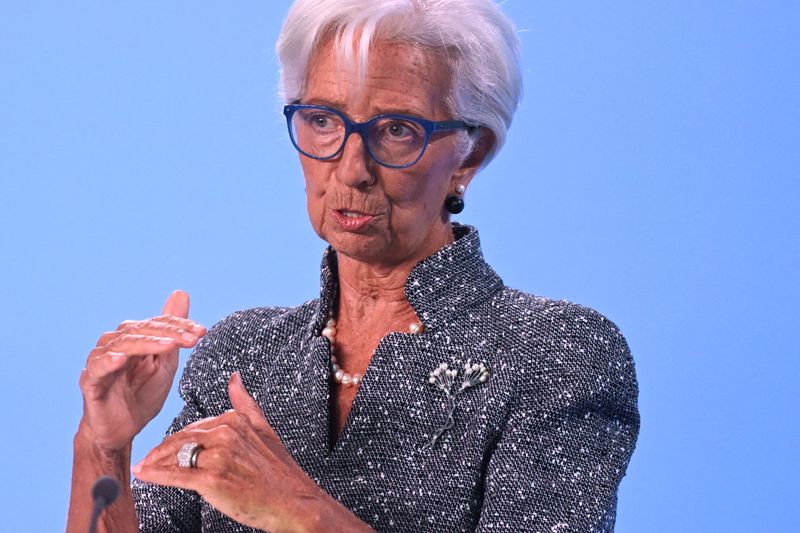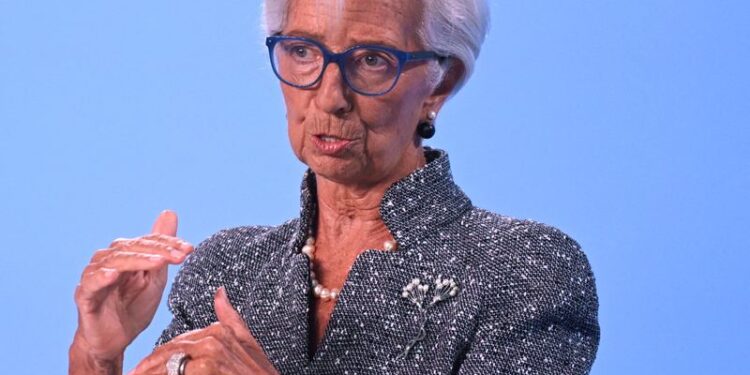FRANKFURT (Reuters) – The European Central Bank cut interest rates for the fourth time this year on Thursday and kept the door open to further easing in 2025 as growth takes a hit from political instability at home and the risk of a fresh trade war with the United States.
Following are highlights of ECB President Christine Lagarde’s comments at a news conference after the policy meeting.
NEUTRAL RATE
“But have we discussed the neutral rate in the last couple of days? No.”
INFLATION COMPOSITION
“We would really want to see a change to the composition of inflation to feel totally confident that we are really almost at target.”
TWO-SIDED INFLATION RISKS
“The risks to inflation … are more two-sided than they were before.”
INFLATION IN TRACK
“We had a Governing Council meeting that was the last of 2024 and which really led us to acknowledge, not yet the victory against inflation, not yet Mission accomplished, but certainly it led us to acknowledge that inflation was really on track in terms of reaching our 2% target in the medium term.
“And you know that gave us a level of confidence to actually decide a cut and to decide the appropriate cut, which is, in our view, 25 basis point. That proposal was agreed by all members of the of the Governing Council.”
ON THIS MONTH’S RATE CUT DISCUSSION
“There were some discussions … to consider possibly 50 basis points, but the overall agreement to which everybody rallied was that 25 basis points was actually the right decision.”
INFLATION TARGET
“In 2025 we shall be at 2% and that is clearly reflected in the projections that we have.”
INFLATION RISKS
“Upside risks to inflation also stem from the heightened geopolitical tensions, which could push energy prices and freight costs higher and disrupt global trade. Moreover, extreme weather events and the unfolding climate crisis more broadly, could drive up food prices by more than expected.
“By contrast, inflation may surprise on the downside if low confidence and concerns about geopolitical events prevent consumption and investment from recovering as fast as expected, if monetary policy dampens demand more than expected, or if the economic environment in the rest of the world worsens unexpectedly.
“Greater friction in global trade would make the euro area inflation outlook more uncertain.”
TRADE RISKS
“The risk of greater friction in global trade could weigh on euro area growth by dampening exports and weakening the global economy.”
ON INFLATION
“We expect inflation to fluctuate around its current level in the near term, as previous sharp falls in energy prices continue to drop out of the annual rates. It should then settle sustainably at around the 2% medium target.”
GROWTH RISKS
“The risks to economic growth remain tilted to the downside.”
UNDERLYING INFLATION
“Underlying inflation is overall developing in line with a sustained return of inflation to target.”
TRADE TENSIONS
“More affordable credit should boost consumption, providing trade tensions do not escalate.”
ECONOMY TO STRENGTHEN
“The economy should strengthen over time, although more slowly than previously expected.”
NOT COMMITTING TO A RATE PATH
“We are determined to ensure that inflation stabilizes sustainably at our 2% medium term target. We will follow a data dependent and meeting by meeting approach to determining the appropriate monetary policy stance.
“In particular our interest rate decisions will be based on our assessment of the inflation outlook in light of the incoming economic and financial data, the dynamics of underlying inflation and the strength of monetary policy transmission.
“We are not committing to a particular rate path.”

MOMENTUM
“(Growth) is losing momentum.”
(Reuters global news desk)






